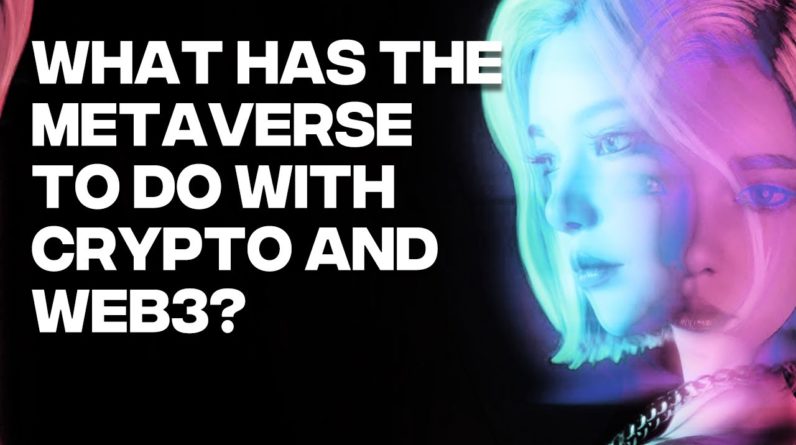
The metaverse is officially a game-changer. Though in its infancy, it's clear that the
metaverse will radically change how we can interact online, how brands advertise, how
fast crypto is adopted, and any number of other facets of life. Hey guys! Welcome back to Crypto Animations, the channel
where we explain to our viewers the different types of Cryptocurrencies and everything new
investors should know! In today's video, we will talk about the metaverse
and its relation to crypto and internet 3.0! So be sure to be attentive because you clearly
don't want to miss out on an amazing opportunity to win a giveaway of a $25 crypto coin of
your choice! Also, if you are new to the channel, be sure
to subscribe to the channel, and turn on post notifications by hitting the bell, so you
never miss any of our uploads. Now with the intro out of the way, let's get
into our topic for today! Recently, the terms "metaverse," "crypto,"
and "Web 3″ have been used interchangeably. While they both point to a vision of a better,
future internet, it's crucial the two concepts not be conflated or become a source of division
around ideologies of how we want to continue building the internet.
The metaverse, which comes from the 1992 sci-fi
novel "Snow Crash" and is more of a vision than a concrete reality. Many people imagine it to be a 3D immersive
world that is synchronous, persistent, and unlimited in concurrent users. It is a digitally native place where we will
spend most of our time working, learning, playing, entertaining. Annie Zhang is the host of the "Hello Metaverse"
podcast, where she explores the cultural and societal implications of its developments. She has been building next-generation social
products at various consumer companies. The metaverse feels vague and speculative
because it hasn't really taken form yet. While some technologists want to anchor the
vision along the lines of Meta's Ready Player One keynote presentation, the reality is the
metaverse will require everyone's input and participation to take form. The current version of the world wide web
or Web 2.0 is characterized by social media platforms, allowing more outstanding user-generated
content.
This is a far cry from Web 1.0, which was
static and non-interactive, an entirely top-down approach to information dissemination. Five big tech companies, namely Twitter, Facebook,
which is now Meta, Google, Apple, Microsoft, and Amazon, control how the data will be used
and where it will be stored and processed. Their algorithms decide the information we
consume, which has left alarm bells ringing. Web 3, on the other hand, is a far more specific
paradigm that provides clear solutions to particular shortcomings of the Web 2 internet. It reacts to the walled-garden ecosystems
that platforms like Facebook and YouTube created, which caused people to have their data extracted,
privacy breached. The ability to control the content they create
is oppressed. Web 3 subverts that model because it directly
addresses ownership and control issues. As the name implies, there have been two versions
of internet computing, progressively adding more and more internet services that open
up new digital doorways. Web 1.0 was the initial phase of the world
wide web that showcased information, but it was limited in ability and didn't offer many
ways to monetize content.
Web 2.0 enhanced its predecessor by sorting
information on websites, allowing information freely to flow from site-owner to user, and
introducing tools for users to generate content. Many people are now calling for a new generation
of the web that will tackle internet flaws that the latest generation is pointing out. Web 3.0 is being promoted heavily because
content creators are outraged that only a few large corporations own most of the websites
and want a way to take power back. Newsfeeds are riddled with narratives that
large social media entities like Twitter reap all the rewards from content generation. Technocrats are calling for a new edition
of the web built on the blockchain, which would hopefully make content-creators owners
of their content and allow them to monetize it accordingly. Rather than a company receiving royalties
off of content, web 3.0 would allot each content creator a token on the blockchain every time
a user accessed their content which would accrue tangible monetary value.
Despite tons of hype and many investors becoming
rich off of crypto, there's no telling when the blockchain will embed itself that deep
into technology. There's been slow adoption across industries
as governing bodies figure out the best way to regulate the blockchain. As a result, content creators might be waiting
quite some time until they receive blockchain tokens on web 3.0. However, that doesn't mean that it won't happen
or that web 3.0 won't encompass some other method of decentralizing content. By building on the blockchain, data is open,
distributed, and collectively owned by peer-to-peer networks. As a result, users own their data, and peer-to-peer
transactions can bypass mediators, and data lives on the blockchain as a public good that
anyone can contribute to and monetize. While Web 3 is a powerful tool to transform
how we can manage data, governance, and exchange money, the slowness of clearing blockchain
transactions limits the settings and use cases in which it makes sense to be applied.

Although a purely decentralized internet model
sounds enticing, there is impracticality to it. While it could be argued that Web 3 is a critical
building block for the metaverse, it is only one component of a greater sum. By acknowledging that Web 3 and decentralization
are simply a building block for the metaverse, it opens up opportunities for other contributors
rather than antagonizing them. When Meta announced its heavily AR/VR-centric
metaverse vision, there was an outcry that Big Tech would dominate the metaverse and
therefore force platforms to operate as a closed ecosystem once again. People missed that the innovation and focus
Meta was pushing for was mainly on hardware and a 3D user consumption and input interface
that, quite frankly, does not exist today. Facebook is trying to solve the immersion
problem, and it's an important one. Many of us have spent the last two years on
Zoom and have become worn out. How will we feel about wearing a VR headset
all day? If we anticipate spending more and more time
in the virtual world enjoyably, we need virtual interfaces that are more immersive, natural
and expressive.
Meta's developments in AR/VR and motion sensing
technologies do not undermine the work of Web 3 and decentralization. The best-case scenario is that people start
building Web 3 applications within the emergent 3D form factors of AR/VR and holographic projections. Another sensationalized opinion is that Web
3 will make Web 2 obsolete. Again, it's hard to imagine such a reality. Despite certain shortcomings of Web 2, many
products operate more effectively without using the blockchain. Platforms like Discord or Twitch help people
communicate and broadcast at scale and in real-time. Companies like Uber or DoorDash effectively
queue up demand and match it with supply. Like it or not, centralization works. OpenSea, currently the largest NFT marketplace,
is fundamentally a centralized marketplace that facilitates transactions on the blockchain. Coinbase is another example of a centralized
exchange that enables transactions of cryptocurrencies.
In both cases, these intermediaries take service
fees on transactions just like any other Web 2 marketplace. While these hybrid products do not align perfectly
with the decentralization ideology, they are critical "bridging products" that help greater
Web 3 elements by appealing to the mainstream. Similarly, Snap Stories was a popular teen
product but struggled with adoption with older users; Meta's adoption of Stories helped it
become a mainstream product for all demographics. Web 3.0 is said to hopefully comprise other
noteworthy features, like infusing AI into internet processing that replicates how humans
distinguish information. Web 3.0 may potentially validate information
quickly and serve it up faster to users. The new internet version may also play nicely
with the new metaverse that's being promoted by tech giants like Microsoft, Apple, Facebook,
and Google. Web 3.0 may allow 3-d designs of websites
and integrate IoT devices into its periphery. Regardless of tech-evangelists shouting in
every corner of the internet about web 3.0, the proposed new internet version has some
opponents who chalk the whole thing up to "vaporware." There isn't any tangible evidence to support
anything about web 3.0, as there's currently no beta in the works, only a bunch of brainstorming
and investments taking place to get a web 3.0 project off the ground.
Still, it isn't hard to stay a believer, as
people scoffed at the idea of the internet when web 1.0 was being introduced. There's still plenty of reason to be hopeful
that the world will turn into a content utopia that pays users fairly one day. Well, guys, that's all we have for you today. What are your thoughts on the metaverse? Let us know in the comments section down below. If you guys liked this video, then be sure
to give this video a big thumbs up! Also, if you don't want to miss out on any
new future videos, then be sure to click on the subscribe button and turn on the notification
under this video so that you're notified the next time we upload a video on the latest
Cryptocurrency news.
Thanks for watching. We hope you have a great day today, and as
always, we'll see you in the next video!.




